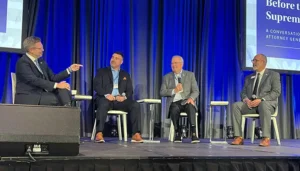SBC 2025: ERLC LUNCHEON SPOTLIGHTS HIGH-STAKES SUPREME COURT CASE
Managing editor, Baptist and Reflector

DALLAS — Randy C. Davis, president and executive director of the Tennessee Baptist Mission Board, was asked on Tuesday what led him to be publicly supportive of, and actively involved with, the ongoing Supreme Court case “U.S. v. Skrmetti.”
Davis said, in this instance, there wasn’t a complex process behind his decision.
“Some cases, such as this one, are just common sense,” he said.
Davis made the remark while participating in a three-person panel discussion during Tuesday afternoon’s Ethic and Religious Liberty Committee (ERLC) luncheon at the SBC annual meeting in Dallas.
The luncheon’s theme was “Protecting our Kids Before the Supreme Court.” The event centered around the U.S. v. Skrmetti case that involves preventing healthcare providers from prescribing medications or performing procedures on minors to “transition” to an identity opposite of their biological sex. The case is expected to have a ruling soon, possibly as early as this week.
Featured speakers at the luncheon included Tennessee attorney general Jonathan Skrmetti — the namesake of the case — and Ryan Bangert, the vice president of Alliance Defending Freedom (ADF).
“The stakes (of this case) couldn’t be higher,” said Bangert, noting that the outcome will impact at least 26 states.
During the panel discussion, which opened the luncheon, Davis was joined by Nathan Lorick, executive director of Southern Baptists of Texas Convention, and Julio Guarneri, executive director of Baptist General Convention of Texas. Both men, like Davis, are from states that have filed amicus briefs alongside the ERLC in Supreme Court cases for 2025. ERLC president Brent Leatherwood served as moderator for the panel.
Topics included the “tricky” decisions that executive directors have to make in regard to which causes they choose to publicly embrace, along with discussion about some of the moral issues facing the culture in the days ahead, including most notably the prominent emergence of Artificial Intelligence.
“I think the advent of AI is going to have a massive impact,” said Davis, noting that he believes the prevalent transgender issues will “probably take a back seat” to AI issues in the days ahead.
“Everyone is scrambling right now.”
Davis noted that Southern Baptists, and all believers, should focus on identifying “how to positively use AI” and “finding guard rails” that would protect against AI being used to promote evil.
In regard to the Skrmetti case, Bangert noted that “this is a fight that has been going on for years and years.” He said the ruling will have a “direct impact on religious liberties.”
Skrmetti said it felt “weird” to have his name attached to such a highly-publicized and consequential case. He said, however, “God puts people where they need to be.”
He noted that he had been reminded of this fact during recent days at Vacation Bible School at his church, where the children are studying Ruth. Skrmetti said the reason the case is so important to him, personally, is because he believes children don’t have the ability to give informed consent “when they don’t understand what they are giving up.”
To that end, Bangert added that current research suggests negative long-term effects of gender-altering surgery. He noted that was not just a personal opinion, but scientific evidence.
Skrmetti reminded attendees that while he is the face of the case, the ultimate outcome rests with others.
“I do not pass laws; I litigate,” he said. “But I will say that it is a privilege to be the point of the spear (for this case). I am incredibly blessed to be the leader of the team that is fighting this fight.” B&R
